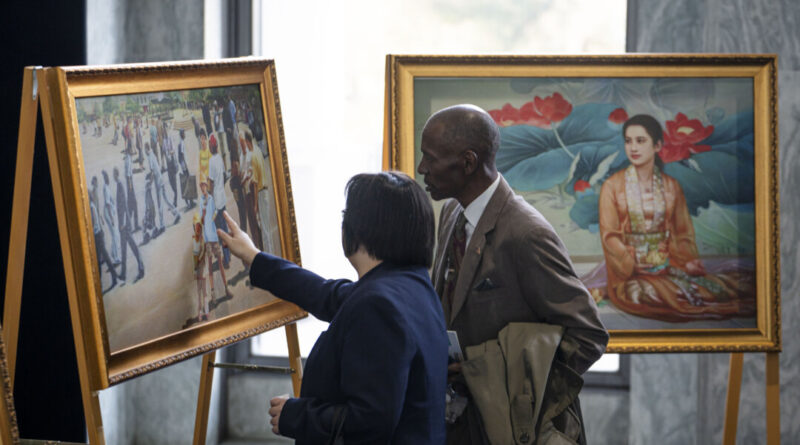Art of Truth, Compassion, and Tolerance Exhibition Graces Congressional Building in Washington
Visitors say they see pain, faith, bravery, beauty, and hope in the paintings.
WASHINGTON—A specially curated version of the Art of Zhen, Shan, Ren (Truth, Compassion, Tolerance) International Exhibition was held at the foyer of the Rayburn House Building in Congress from Nov. 12 to Nov. 15.
The 17 paintings depict Chinese people’s unwavering belief in truth, compassion, and forbearance—tenets of the Falun Gong spiritual practice. In July 1999, the Chinese Communist Party (CCP) launched a nationwide persecution, targeting an estimated 70 million to 100 million Falun Gong practitioners at the time.
Rep. Don Bacon (R-Neb.) called the artwork “beautiful” and “absolutely gorgeous.”

Rep. Don Bacon (R-Neb.) at Congress in Washington on Jan. 3, 2019. Samira Bouaou/The Epoch Times
“I feel for the Falun Gong and all the religious minorities. It’s an atheistic country, communist China. They are persecuting a lot of different people of faith, and Americans should stand up to that,” Bacon told Epoch Times’ sister media outlet NTD.
The paintings “definitely convey the pain, but also the hope” of Falun Gong practitioners, said a congressional staff member, who was granted anonymity to discuss matters outside her work.
“We believe it is New York based on the building in the background, but just having the child at the forefront, being the youth and the hope, and the flower in her hair, and holding the sign just really proves the pain, also the resistance that has come forth from the Chinese Communist Party’s actions,” she told The Epoch Times.

“Homeless” Courtesy of The Art of Zhen Shan Ren
He told The Epoch Times that the painting was “particularly powerful” and “speaks to the callousness of what’s going on.”
Myrtle Alexander, the GOP candidate for representing the District of Columbia in Congress but lost to the incumbent in the November election, said the beauty of the arts drew her to the exhibit while walking in the hallways of the Rayburn building.
“When you look at the whole movement of Falun Gong and the peacefulness of it, and the fact that the Chinese Communist Party tries to quench the spirit of people,” she told The Epoch Times, “they can harm the body, but they can’t kill the soul.”
Understanding China
Will, another congressional staffer who didn’t wish to disclose his surname, told The Epoch Times that the paintings “make you want to be a better person.” His favorite piece is also “The Call of Innocence,” which he said sends out a “very strong message.”
He added that knowing about the persecution in China would help people gain a comprehensive understanding of the country and foster consideration for U.S.–China relations.
Banyon Vassar, an information technology director with a congressional committee, said he saw “bravery” in the paintings.
“We are given the propaganda and the impression that democracy and freedom don’t work well over here, and that’s why we end up in our situation, and that if we only did ascribe to what China is doing, then we would all be living this futuristic, happy life,” Vassar told The Epoch Times.
“I will say this [exhibit] is enlightening. I’m learning from these paintings and seeing the outstretch of everyone’s expression of sadness while remaining faithful. Nothing implies that anyone is changing their mind about worshiping because they’re being persecuted.”

Congressional staffers at the Art of Zhen, Shan, Ren (Truth, Compassion, Tolerance) International Exhibition at the foyer of the Rayburn House Building in Capitol Hill, Washington, on Nov. 13, 2024. Jenny Jing/The Epoch Times
Falun Gong Protection Act
Over the 25 years of the ongoing persecution, Congress has passed multiple resolutions condemning the atrocities, particularly the crimes of killing prisoners of conscience, including those who believe in the spiritual practice, for their organs.
However, this year, the legislative branch is considering a legally binding bill to address the persecution for the first time.

Visitors at the Art of Zhen, Shan, Ren (Truth, Compassion, Tolerance) International Exhibition at the foyer of the Rayburn House Building in Capitol Hill, Washington, on Nov. 13, 2024. Jenny Jing/The Epoch Times
Jenny Jing and Eva Fu contributed to this report.





